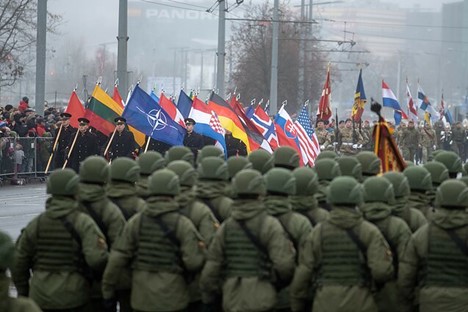
The Summit of Allied leaders will take place on June 14, 2021 at NATO headquarters in Brussels, Belgium. NATO Secretary General Jens Stoltenberg announced that decisions will be taken on “our substantive and forward-looking NATO 2030 agenda to deal with the challenges of today and tomorrow: Russia’s aggressive action, the threat of terrorism, cyber attacks, emerging and disruptive technologies, the security impact of climate change, and the rise of China”.
In the run up to the summit, the prime ministers of Estonia, Latvia and Lithuania have called for continued allied military presence in the Baltics.

On June 7, the Baltic prime ministers issued a joint statement, saying that the NATO summit on June 14 would be “a crucial moment for the allies to reiterate NATO’s unity and strengthen the transatlantic bond”. The statement also highlighted the importance of continued allied military presence in the Baltic states and the need to further strengthen Baltic defence cooperation.
The prime ministers of the three countries reaffirmed the commitment to a strong NATO-EU strategic partnership and to NATO’s open door policy. The joint statement was signed by Lithuanian Prime Minister Ingrida Šimonytė and her Latvian and Estonian counterparts Arturs Krišjānis Kariņš and Kaja Kallas.
“We expect the summit to give a clear and strong assessment on the threat posed by Russia and further adapt NATO’s response. Russia seeks to destabilise NATO and undermine the security of NATO allies and partners,” the document said. “Russia also systematically engages in carrying out illegal operations on Alliance territory, in malign and dangerous cyber activities, disseminating disinformation, interfering in elections, and exploiting divisions within democratic societies,” noted the Baltic prime ministers. They also expressed hope that the allies would “commit to strengthening and modernising NATO’s Force Structure to meet the collective defence requirements to respond to any crisis and conflict”. The Baltic countries, in their turn, reiterated their commitment to increase defence spending to meet the threshold of 2 percent of GDP.
Jens Stoltenberg met with Lithuanian Prime Minister Ingrida Simonyte on June 4 in Brussels, and delivered a keynote speech on NATO aspirations in advance of the June 14 NATO summit. In the speech he called for adaptability, modernization and more investment from members of the alliance. His virtual address is regarded as the keynote speech for the in-person summit involving world leaders, including U.S. President Joe Biden. Stoltenberg spoke of adherence to the NATO 2030 agenda, a policy statement issued in 2020 calling for “making sure [that] NATO remains strong militarily, becomes even stronger politically and takes a more global approach.” Earlier that week, he recommended that the 30-nation military bloc engage in more effective pooling of resources.
“In a more competitive and unpredictable world, we need transatlantic unity – Europe and North America standing strong together in NATO – so the goal of our NATO 2030 initiative is to prepare our alliance for the future,” Stoltenberg said. He outlined key agenda points for the summit, notably a strengthening NATO as a forum for political consultations, reinforcing collective defense through improved readiness, modernized capabilities and objectives to make societies less vulnerable to attack and coercion.
“To do all of this we need to invest more,” Stoltenberg said, mentioning seven years of consecutive defense spending increases by Canada and European allies. “We should also invest better. That is why we should increase NATO’s common-funded budget.”
Stoltenberg denied that Turkey, a NATO member, had persuaded the bloc to soften its stance in condemning Belarus for its forced diversion of a plane traveling from Athens to Vilnius, Lithuania, on May 23. “NATO is united and NATO allies, all 30 NATO allies, agreed on a very strong statement last week, where we strongly condemned the forced landing of civilian aircraft on its way from one NATO capital Athens to another NATO capital Vilnius,” Stoltenberg said. The European Union and the United States have also condemned the incident.
News from LRT.lt, NATO



























